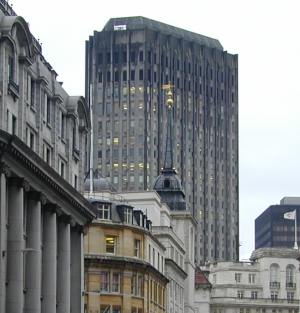London Stock Exchange

The London Stock Exchange (LSE) is a stock exchange in London, England. It is the biggest stock exchange in the Europe and third largest in the world.[1]
The Royal Exchange, London was officially opened on 23 January 1571 by Queen Elizabeth I. This is where the regulated stock market started. From 1801 dealers had to pay a subscription. The government used the Exchange's organised market (and would most likely not have managed without it) to raise the enormous amount of money required for the wars against Napoleon.[2]
The new Stock Exchange Tower was opened on 8 November 1972; it was a new City landmark, with a 23,000 sq ft (2,100 m2) trading floor. From 1973 women and foreign-born members were allowed. The London Stock Exchange formally merged with the eleven British and Irish regional exchanges. It became a company, no longer owned by its members in 2001.
In 2004 it moved to a brand-new headquarters in Paternoster Square. It bought Refinitiv, a financial data company, in 2019 for $27 billion. It then sold Borsa Italiana, the owner of Milan’s stock exchange.
The growth of the electronic processing of financial transactions means that face-to-face trading no longer happens. Normal trading sessions are from 08:00 to 16:30 local time every day of the week except Saturdays, Sundays and holidays declared by the exchange in advance.[3]
In 2011 there were 2,938 companies from over 60 countries listed on the London Stock Exchange. The total value of these companies is £3.9 trillion.[4]
The FTSE 100 Index (often called the "Footsie") is like the Dow Jones Industrial Average in the United States. FTSE stands for Financial Times Stock Exchange. The 100 most valuable companies listed are tracked. The value of a company is calculated by multiplying the share price of the company by the total number of shares they have issued. The index took the place of the FT30 in January 1984. [5]
The FTSE 250 follows the share prices of the 101st to the 350th largest companies. There is also the FTSE 350 Index which combines the FTSE 100 and 250, and the FTSE SmallCap Index, which tracks the 351st to the 619th largest-listed companies. The the FTSE All-Share Index is an index of all 620 companies listed.
They are calculated by computers in real time, and the cost of shares in the companies is reported every minute.
In 2023 data and analytics businesses made most of the company's money. Less than 4% came from listing and trading cash equities. Microsoft bought 4% of the company in 2022.[6]
References
[change | change source]- ↑ "Archived copy" (PDF). Archived from the original (PDF) on 2013-07-22. Retrieved 2013-04-03.
{{cite web}}: CS1 maint: archived copy as title (link) - ↑ Ranald Michie (1999). The London Stock Exchange: A History. Oxford University Press. ISBN 9780191529344. Archived from the original on 11 January 2023. Retrieved 7 June 2019.
- ↑ "LSE Trading Hours & Market Holidays [2023]". www.tradinghours.com. Retrieved 2023-08-22.
- ↑ "LSE in merger with Canada's TMX". BBC News. 9 February 2011.
- ↑ "Penny Stock Alerts - Free Penny Stock Newsletter Picks". www.pennystockdream.com.
- ↑ Asgari, Nikou (2023-11-16). "LSE Group: when equities are no longer the stock in trade". Financial Times. Retrieved 2023-11-16.